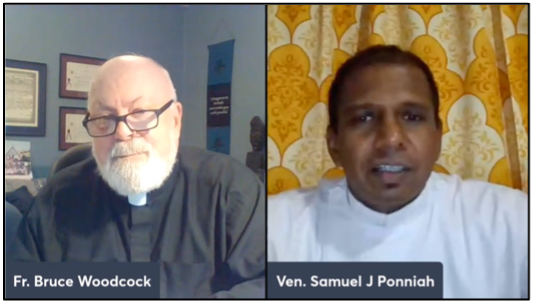The season of Epiphany is when we celebrate the revealing of Christ to the world. We mark the arrival of the One who is the light of the world: a light that brings life, a light that brings hope. This light shines its brightest when we are in community – with God and with one another. The Office of Global Partnerships of The Episcopal Church invites individuals, small groups, congregations, and dioceses to use our weekly video series throughout the season of Epiphany to draw closer to each other and our Lord. Using an adaptation of lectio divina with the gospel passage for each Sunday, you’ll meet and hear from Episcopalians and Anglican partners from around the world as they read and reflect on Jesus’ revelation to us.

This week’s lectio divina features the Rev. Canon Bruce Woodcock, Partnership Officer for Asia and the Pacific, and the Ven. Samuel J. Ponniah, Archdeacon of Jaffna, Diocese of Colombo, in the Anglican Church of Ceylon (Sri Lanka). Watch their discussion at iam.ec/epiphany2022 and follow along by yourself or in a small group. To participate:
1. Read today’s Gospel passage:
Jesus came down with the twelve apostles and stood on a level place, with a great crowd of his disciples and a great multitude of people from all Judea, Jerusalem, and the coast of Tyre and Sidon. They had come to hear him and to be healed of their diseases; and those who were troubled with unclean spirits were cured. And all in the crowd were trying to touch him, for power came out from him and healed all of them. Then he looked up at his disciples and said:
“Blessed are you who are poor, for yours is the kingdom of God. Blessed are you who are hungry now, for you will be filled. Blessed are you who weep now, for you will laugh. Blessed are you when people hate you, and when they exclude you, revile you, and defame you on account of the Son of Man. Rejoice in that day and leap for joy, for surely your reward is great in heaven; for that is what their ancestors did to the prophets. But woe to you who are rich, for you have received your consolation. Woe to you who are full now, for you will be hungry. Woe to you who are laughing now, for you will mourn and weep. Woe to you when all speak well of you, for that is what their ancestors did to the false prophets.” (Luke 6:17-26, NRSV)
2. Reflect:
Which word or short phrase caught your attention or came to mind? Whether you’re alone or in a group, say it aloud.
3. Read:
Reread the passage, perhaps in a different translation. In this week’s video, you’ll hear the text in Portuguese.
4. Reflect:
Where does the passage touch your life today? If you’re with a group, share your responses with each other, without discussing further. If you’re alone, say your response aloud or write it down.
5. Read:
Reread the passage, perhaps in yet another translation.
6. Reflect:
From what I’ve heard and shared, what do I believe God wants me to do or be? Is God inviting me to change in any way? You might consider journaling out your response and meditating on it over the course of this week.
7. Pray:
In closing, say the Lord’s Prayer, today’s collect, or the Collect for Proper 28 in the Book of Common Prayer (p. 236).
13 de febrero de 2022 – Epifanía 6(C)
Alianzas Globales Lectio Divina: Fr. Bruce Woodcock y el Ven. Samuel J. Ponniah
La estación de la Epifanía es cuando celebramos la revelación de Cristo al mundo. Celebramos la llegada de Aquel que es la luz del mundo: una luz que da vida, una luz que trae esperanza. Esta luz brilla más intensamente cuando estamos en comunidad, con Dios y entre nosotros. La Oficina de Asociaciones Globales de la Iglesia Episcopal invita a personas, grupos pequeños, congregaciones y diócesis a utilizar nuestra serie de videos semanales durante la estación de la Epifanía para acercarnos unos a otros y a nuestro Señor. Utilizando una adaptación de la lectio divina con el pasaje del evangelio para cada domingo, conocerá y oirá a episcopales y socios anglicanos de todo el mundo mientras leen y reflexionan sobre la revelación de Jesús a nosotros.
La lectio divina de esta semana presenta al Rvdo. Canónigo Bruce Woodcock, oficial de asociaciones para Asia y el Pacífico, y al Ven. Samuel J. Ponniah, Archidiácono de Jaffna, Diócesis de Colombo, en la Iglesia Anglicana de Ceilán (Sri Lanka). Para participar:
1. Lea el pasaje del Evangelio de hoy: Jesús bajó del cerro con ellos y se detuvo en un llano. Se habían juntado allí muchos de sus seguidores y mucha gente de toda la región de Judea, de Jerusalén y de la costa de Tiro y Sidón. Habían llegado para oír a Jesús y para que los curara de sus enfermedades. Los que sufrían a causa de espíritus impuros, también quedaban sanos. Así que toda la gente quería tocar a Jesús, porque los sanaba a todos con el poder que de él salía.
Jesús miró a sus discípulos, y les dijo: «Dichosos ustedes los pobres, pues de ustedes es el reino de Dios.
»Dichosos ustedes los que ahora tienen hambre, pues quedarán satisfechos.
»Dichosos ustedes los que ahora lloran, pues después reirán.
»Dichosos ustedes cuando la gente los odie, cuando los expulsen, cuando los insulten y cuando desprecien su nombre como cosa mala, por causa del Hijo del hombre. Alégrense mucho, llénense de gozo en ese día, porque ustedes recibirán un gran premio en el cielo; pues también así maltrataron los antepasados de esa gente a los profetas.
»Pero ¡ay de ustedes los ricos, pues ya han tenido su alegría!
»¡Ay de ustedes los que ahora están satisfechos, pues tendrán hambre!
»¡Ay de ustedes los que ahora ríen, pues van a llorar de tristeza!
»¡Ay de ustedes cuando todo el mundo los alabe, pues así hacían los antepasados de esa gente con los falsos profetas!. (Lucas 5:1-11, Dios Habla Hoy).
2. Reflexione: ¿Qué palabra o frase corta le llamó la atención o le vino a la mente? Ya sea que esté solo o en grupo, dígalo en voz alta.
3. Lea: Vuelva a leer el pasaje, quizás en una traducción diferente. En el video de esta semana, oirá el texto en portugués.
4. Reflexione: ¿Dónde le toca el pasaje en su vida hoy? Si está con un grupo, comparta su respuesta entre sí, sin discutir más. Si está solo, diga su respuesta en voz alta o escríbala.
5. Lea: Vuelva a leer el pasaje, tal vez en otra traducción.
6. Reflexione: Por lo que he oído y compartido, ¿qué creo que Dios quiere que yo haga o sea? ¿Dios me está invitando a cambiar de alguna manera? Podría considerar escribir su respuesta en un diario y meditar en ella durante el transcurso de esta semana.
7. Ore: Para terminar, diga el padrenuestro, la colecta de hoy, o colecta para el propio 28 en el Libro de Oración Común (p. 152).
